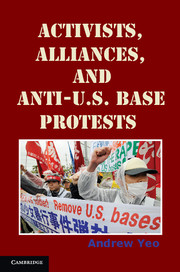Book contents
- Frontmatter
- Contents
- List of Figures
- List of Tables
- Preface and Acknowledgments
- List of Abbreviations
- Introduction
- 1 Anti-Base Movements and the Security Consensus Framework
- 2 Under a Weak Security Consensus
- 3 The U.S.-Japan Alliance and Anti-Base Movements in Okinawa, 1995–1996
- 4 Anti-Base Movements in Ecuador and Italy
- 5 South Korean Anti-Base Movements and the Resilience of the Security Consensus
- 6 Alliance Relations and the Security Consensus Across Time
- 7 Activists, Alliances, and the Future of U.S. Basing Strategy
- Appendix: Selected List of Interviews
- Bibliography
- Index
- References
2 - Under a Weak Security Consensus
Philippine Anti-Base Movements, 1990–1991
Published online by Cambridge University Press: 05 June 2012
- Frontmatter
- Contents
- List of Figures
- List of Tables
- Preface and Acknowledgments
- List of Abbreviations
- Introduction
- 1 Anti-Base Movements and the Security Consensus Framework
- 2 Under a Weak Security Consensus
- 3 The U.S.-Japan Alliance and Anti-Base Movements in Okinawa, 1995–1996
- 4 Anti-Base Movements in Ecuador and Italy
- 5 South Korean Anti-Base Movements and the Resilience of the Security Consensus
- 6 Alliance Relations and the Security Consensus Across Time
- 7 Activists, Alliances, and the Future of U.S. Basing Strategy
- Appendix: Selected List of Interviews
- Bibliography
- Index
- References
Summary
September 16, 1991, may well be the day when we in this Senate found the soul, the true spirit of this nation because we mustered the courage and the will to declare the end of foreign military presence in the Philippines.… Therefore, I vote No to this Treaty, and if it were only possible, I would vote 203 million times No.
With a resounding “No,” Senate President Jovito Salonga cast the final vote against the Treaty of Friendship, Cooperation, and Security between the Republic of the Philippines (R.P.) and the United States. The final tally totaled 12–11 against the Treaty, effectively ending over ninety years of U.S. military presence in the Philippines. Salonga's vote was perhaps less suspenseful than the 12–11 margin would suggest since the Philippine Senate only needed eight out of twenty-three “No” votes to reject the Treaty. Nevertheless, the rejection of the Treaty and U.S. bases in the Philippines was a monumental day for Filipinos. The decision was all the more astonishing given that a traditionally conservative institution such as the Senate ultimately snubbed its nose against its primary international benefactor. Asking how an economically deprived, politically unstable country held its own against a world superpower, Roland Simbulan, a longtime Philippine activist and scholar, and advisor to Senator Wigberto Tañada during the R.P.-U.S. base negotiations, replied, “The real moving spirit behind the twelve Senators was the broad and unified people's movement outside the Senate....[T]he Anti-Treaty Movement was forged with the broadest unity possible among organized forces and indivduals. In that end, it was the power of the people that ended the most visible symbols of our colonial legacy and the Cold War in the Philippines.”
- Type
- Chapter
- Information
- Activists, Alliances, and Anti-U.S. Base Protests , pp. 35 - 62Publisher: Cambridge University PressPrint publication year: 2011



